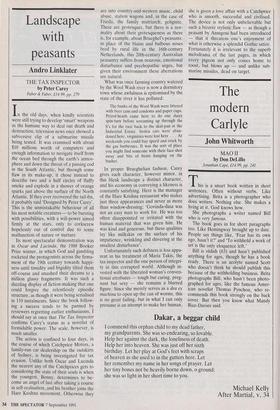Landscape with peasants
Andro Linklater
THE TAX INSPECTOR by Peter Carey
Faber & Faber, £14.99, pp, 279
In the old days, when kindly scientists were still trying to develop 'smart' weapons as the humane way to deal out death and destruction, television news once showed a subversive clip of a submarine missile being tested. It was crammed with about $10 millions worth of computers and enough information to navigate itself from the ocean bed through the earth's atmos- phere and down the throat of a passing cod in the South Atlantic, but through some flaw in its make-up, it chose instead to describe two and a half circles of fluffy smoke and explode in a shower of orange sparks just above the surface of the North Atlantic. If they ever recovered the tail-fin, it probably said 'Designed by Peter Carey'. This is the unmistakable behaviour of all his most notable creatures— to be bursting with possibilities, with a will-power aimed firmly at the stars, only to corkscrew hopelessly out of control due to some malfunction of nature or nurture.
Its most spectacular demonstration was in Oscar and Lucinda, the 1988 Booker Prize winner, in which God and gambling rocketed the protagonists across the firma- ment of the 19th century towards happi- ness until timidity and frigidity tilted them off-course and smashed their dreams to a million glassy fragments. It was such a dazzling display of fiction-making that one could forgive the relentlessly episodic structure, as though it were being serialised in 110 instalments. Since the book follow- ing a success tends to be panned by reviewers regretting earlier enthusiasms, I should say at once that The Tax Inspector confirms Carey's status as a novelist of formidable power. The scale, however, is much smaller.
The action is confined to four days, in the course of which Catchprice Motors, a family-run car dealership on the outskirts of Sydney, is being investigated for tax evasion. Unlike both Oscar and Lucinda the nearest any of the Catchprices gets to considering the state of their souls is when the youngest, Benny, determines to be- come an angel of lust after taking a course in self-realisation, and his brother joins the Hare Krishna movement. Otherwise they
are into country-and-western music, child abuse, station wagons and, in the case of Frieda, the family matriarch, gelignite. These are grotesques, but there is a nor- mality about their grotesqueness as there is, for example, about Brueghel's peasants: in place of the blains and bulbous noses bred by rural life in the 16th-century Netherlands, this 20th-century Australian peasantry suffers from neurosis, emotional disturbance and psychopathic urges, but given their environment these aberrations are natural.
What was once farming country watered by the Wool Wash river is now a dormitory town whose awfulness is epitomised by the state of the river it has polluted:
The banks of the Wool Wash were littered with beer cans and condoms and paper cups. Petrol-heads came here to do one dusty spin-turn before screaming up through the S's for the race back to the skid-pan at the Industrial Estate. Stolen cars were aban- doned here, virginities were lost here . . At weekends you could buy speed and crack by the gas barbecues. It was the sort of place you might find someone with their face shot away and bits of brain hanging on the bushes.
In proper Brueghelian fashion, Carey gives each character, however minor, in this bleak landscape a distinct character, and his economy in conveying a likeness is constantly satisfying. Here is the manager of the Hare Krishna restaurant who makes just three appearances and never as more than window-dressing: 'Govinda-dasa was not an easy man to work for. He was too often disappointed or irritated with the human material that was given him. He was kind and generous, but these qualities lay like milkskin on the surface of his impatience, wrinkling and shivering at the smallest disturbance'.
Unfortunately such deftness is less appa- rent in his treatment of Maria Takis, the tax inspector and the one person of integri- ty in this corrupted world. Although in- vested with the liberated woman's conven- tional attributes — tough but caring, preg- nant but sexy — she remains a blurred figure. Since she merely serves as a dea ex machina to open up the can of worms, this is no great failing, but in what I can only presume is an attempt to make her human,
she is given a love affair with a Catch price who is smooth, successful and civilised. The device is not only unbelievable but such a bizarre stylistic flaw — as though a peasant by Annigoni had been introduced — that it threatens one's enjoyment of what is otherwise a splendid Gothic satire. Fortunately it is irrelevant to the superb melodrama of the last pages, in which every pigeon not only comes home to roost, but blows up — and unlike sub- marine missiles, dead on target.


















































 Previous page
Previous page